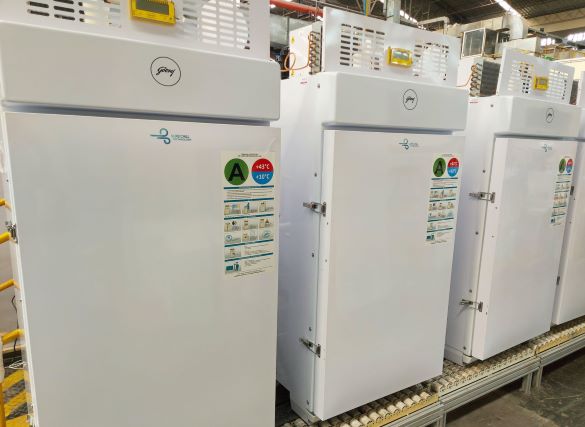Godrej & Boyce, the flagship company of the Godrej Group, has been contributing to making India self-reliant since its inception. Taking a step further towards building the nation’s healthcare infrastructure, Godrej & Boyce through its business unit Godrej Appliances, has been partnering the ongoing Covid vaccination drive in India through its advanced, made in India, medical refrigeration solutions which safeguard the sensitive vaccines at just the right temperature. Today, it added state of art ultra-low temperature freezers to its portfolio, strengthening the vaccine cold chain further. These advanced medical freezers can preserve life-saving medical supplies including critical vaccines below -80°C and are aimed at boosting both Indian and global medical cold chain.
Godrej Appliances is currently deploying vaccine refrigerators which maintain a precise temperature of 2 to 8°C to store the highly temperature sensitive Covaxin and CoviShield vaccines being administered in India, as part of the national tender it received in October 2020. Medical Freezers which maintain -20°C are also being deployed for diluents and ice packs needed for the last mile delivery in the Covid vaccination drive. The vaccines run the risk of damage if they are subjected to fluctuations beyond the specified temperature band, leading to both health and economic implications.
The ultra low temperature freezers are a new addition to this portfolio and are particularly suited to mRNA based vaccines which are being deployed in other countries currently. The mRNA-based Covid 19 vaccines are extremely temperature-sensitive as well and must be stored at very cold temperatures. mRNA is constantly at risk of being destroyed by other molecules in the environment. Although manufacturers of the vaccines have made chemical changes to the synthetic mRNA and wrapped it in a protective layer, they need to be stored at temperatures as low as below -80°C, to prevent wastage of vaccines, which has a direct implication on human health. Hence, any wastage or inefficiency in the vaccination process due to logistical issues related to cold chain must be avoided.
The operating principle for the Godrej Ultra Low Temperature freezer is a cascading system having a PHE (Plate heat exchanger) as a heat exchanger between the primary and the secondary system. This lowers the standing pressure of the secondary system leading to lowering of temperature. Additionally, Godrej Ultra Low Temperature Freezers have inbuilt safety systems with alarms to protect secondary compressor in case of unlikely pressure build up. Features like (a) 2 step sealing & Internal separate doors to help avoid temperature ingress and (b) Oil recovery for secondary system for long running, boost the overall efficiency of the unit during operation. Furthermore, back-up systems like Liquid CO2 or Liquid NO2 ensure safety of stock stored, by maintaining a stable temperature for over 48 hours, in case of a power outage or an unlikely system failure.
The current capacity for Ultra Low Temperature Freezers is 12,000 units per annum, which Godrej Appliances is working towards quickly ramping up to 30,000 units per annum, to meet the growing global demand.
Godrej Appliances is also exploring other ways to assist in the next phase of vaccine deployment till the last mile. It has successfully piloted a mobile clinic in rural Maharashtra, running an ambulance equipped with a vaccine refrigerator, without connecting it to a power source for three days. The temperature was monitored every 2 hours and met the required temperature norms. As India accelerates the pace of vaccinations, more agile remote deployment may hold the key to success.
Godrej & Boyce has been committed to serving the country especially in the trying pandemic times, through its diverse offerings – be it through medical components – Hospital Bed Actuators and Electro-magnetic valves for ventilators, or through disinfectant devices aimed at keeping the population safer at home, or setting up socially distant offices to keep people safe at work; and is proud to serve not just the country but the world with Made in India medical refrigerators, freezers and ultra-low temperature freezers, at a time when they are most needed.
Commenting on the recent developments, Mr. Jamshyd Godrej, Chairman and Managing Director, Godrej & Boyce Manufacturing Company Ltd. said, “Depth of coverage and sustenance of Covid-19 vaccination drive will be key to ward off further spread of the pandemic. Today, nations across the globe are facing challenges in running effective covid-19 vaccination programs. Inadequate cold chain equipment is one of the key challenges, which can lead to inefficacy of the vaccines and cost human health. With Godrej’s decades of expertise in refrigeration technology, the brand offers a range of advanced cold storage solutions for vaccines and life-saving supplies that can help governments across the world in their fight against the covid-19. This pandemic has underscored the need to be future ready when it comes to vaccine cold chain infrastructure. As a group we are constantly transforming to get newer technologies and partner to make the nation self-reliant. Our latest offering of Ultra Low Temperature Freezers will help make India more ready for vaccines of the future as well. This endeavor also brings alive our ethos of Made in India for the World.”
Commenting on these developments, Mr. Kamal Nandi, Business Head and Executive Vice President, Godrej Appliances said, “We are glad that we have been able to apply our refrigeration expertise in developing a strong vaccine cold chain in India at a critical time. Our medical refrigerators and medical freezers deliver the precise cooling temperature of 2°C – 8°C and -20°C respectively, needed for the vaccines being administered by India currently. Now, with our newly launched range of advanced ultra-low temperature freezers, which can provide a temperature of below -80°C, India will also have the storage solutions readily available, for other Covid-19 vaccines being deployed across the world. We are partnering with various stakeholders in strengthening the healthcare cold chain and aiming to assist in other potential vaccine roll out challenges – like through mobile clinics for last mile vaccine deployment in remote areas, for the next phase of Covid-19 vaccine inoculation.”



Average Rating